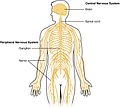Wooden chest syndrome
Wooden Chest Syndrome is a rare but serious condition characterized by severe chest wall rigidity and respiratory distress following the administration of certain opioids, most notably fentanyl. This condition is of particular concern in the fields of anesthesiology and emergency medicine.
Pathophysiology[edit]
Wooden Chest Syndrome is primarily associated with the administration of fentanyl, a potent synthetic opioid. The exact mechanism is not fully understood, but it is believed that fentanyl and similar opioids can cause increased muscle tone in the chest wall muscles, leading to rigidity. This rigidity can severely impair the ability of the chest to expand during inspiration, resulting in respiratory distress and potentially respiratory failure.
Clinical Presentation[edit]
Patients with Wooden Chest Syndrome typically present with sudden onset of:
- Chest wall rigidity
- Respiratory distress
- Difficulty in ventilation
These symptoms can occur within minutes of opioid administration, especially when given rapidly or in high doses.
Diagnosis[edit]
The diagnosis of Wooden Chest Syndrome is primarily clinical, based on the history of recent opioid administration and the characteristic presentation of chest wall rigidity and respiratory distress. It is important to differentiate this condition from other causes of respiratory distress, such as bronchospasm or pulmonary edema.
Management[edit]
The management of Wooden Chest Syndrome involves:
- Immediate cessation of opioid administration
- Administration of naloxone, an opioid antagonist, which can rapidly reverse the effects of opioids
- Supportive care, including oxygen therapy and, if necessary, mechanical ventilation
Prevention[edit]
To prevent Wooden Chest Syndrome, it is recommended to:
- Administer opioids slowly, especially potent ones like fentanyl
- Use the lowest effective dose
- Monitor patients closely for signs of respiratory distress
Prognosis[edit]
With prompt recognition and treatment, the prognosis for Wooden Chest Syndrome is generally good. However, delayed treatment can lead to significant complications, including hypoxia and cardiac arrest.
See Also[edit]
External Links[edit]
-
Lungs and chest wall
-
Fentanyl
-
Overview of Nervous System
-
Bronchoscopy
-
Naloxone
Ad. Transform your life with W8MD's Budget GLP-1 injections from $75


W8MD offers a medical weight loss program to lose weight in Philadelphia. Our physician-supervised medical weight loss provides:
- Weight loss injections in NYC (generic and brand names):
- Zepbound / Mounjaro, Wegovy / Ozempic, Saxenda
- Most insurances accepted or discounted self-pay rates. We will obtain insurance prior authorizations if needed.
- Generic GLP1 weight loss injections from $75 for the starting dose.
- Also offer prescription weight loss medications including Phentermine, Qsymia, Diethylpropion, Contrave etc.
NYC weight loss doctor appointmentsNYC weight loss doctor appointments
Start your NYC weight loss journey today at our NYC medical weight loss and Philadelphia medical weight loss clinics.
- Call 718-946-5500 to lose weight in NYC or for medical weight loss in Philadelphia 215-676-2334.
- Tags:NYC medical weight loss, Philadelphia lose weight Zepbound NYC, Budget GLP1 weight loss injections, Wegovy Philadelphia, Wegovy NYC, Philadelphia medical weight loss, Brookly weight loss and Wegovy NYC
|
WikiMD's Wellness Encyclopedia |
| Let Food Be Thy Medicine Medicine Thy Food - Hippocrates |
Medical Disclaimer: WikiMD is not a substitute for professional medical advice. The information on WikiMD is provided as an information resource only, may be incorrect, outdated or misleading, and is not to be used or relied on for any diagnostic or treatment purposes. Please consult your health care provider before making any healthcare decisions or for guidance about a specific medical condition. WikiMD expressly disclaims responsibility, and shall have no liability, for any damages, loss, injury, or liability whatsoever suffered as a result of your reliance on the information contained in this site. By visiting this site you agree to the foregoing terms and conditions, which may from time to time be changed or supplemented by WikiMD. If you do not agree to the foregoing terms and conditions, you should not enter or use this site. See full disclaimer.
Credits:Most images are courtesy of Wikimedia commons, and templates, categories Wikipedia, licensed under CC BY SA or similar.
Translate this page: - East Asian
中文,
日本,
한국어,
South Asian
हिन्दी,
தமிழ்,
తెలుగు,
Urdu,
ಕನ್ನಡ,
Southeast Asian
Indonesian,
Vietnamese,
Thai,
မြန်မာဘာသာ,
বাংলা
European
español,
Deutsch,
français,
Greek,
português do Brasil,
polski,
română,
русский,
Nederlands,
norsk,
svenska,
suomi,
Italian
Middle Eastern & African
عربى,
Turkish,
Persian,
Hebrew,
Afrikaans,
isiZulu,
Kiswahili,
Other
Bulgarian,
Hungarian,
Czech,
Swedish,
മലയാളം,
मराठी,
ਪੰਜਾਬੀ,
ગુજરાતી,
Portuguese,
Ukrainian




